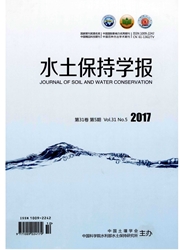

 中文摘要:
中文摘要:
团聚体的力稳性是决定土壤抗侵蚀能力的关键因素。为探究地带性土壤团聚体抗张强度的变化规律及其影响因素,自北向南选取我国中南部地区6种典型地带性土壤(褐土、黄褐土、棕红壤、红壤、赤红壤和砖红壤)的不同粒径(1-2,2-3,3-5,5-10mm)团聚体作为研究对象,通过测定团聚体的抗张强度(TS),探究其与土壤基本理化性质的关系,揭示该区域团聚体抗张强度的变化特点和稳定机制。结果表明:(1)供试土壤皆为黏性土壤,自北向南,随着水热条件的增加,土壤的pH值逐渐降低,高岭石含量和游离氧化物(Fed、Ald)呈现明显的增加趋势;有机质含量随土壤深度的增加而降低。(2)同种土壤团聚体的抗张强度随着粒径的增大而逐步减小,从北至南,相同粒径团聚体的抗张强度整体呈现减小的趋势。(3)TS与pH、粉粒含量、蛭石含量呈极显著正相关(r〉0.63,p〈0.01),TS与黏粒含量、1.4nm过渡矿物含量、高岭石含量、游离氧化铁、铝(Fed、Ald)呈显著负相关(r〈-0.53,p〈0.05)。(4)逐步回归分析表明,Fed和CEC可以较好的预测和评价3-5mm团聚体的抗张强度(R^2=0.80,p〈0.01)。总体而言,黏土矿物类型及其含量是影响地带性土壤团聚体力稳性的重要因素。研究结果可为该区域土壤侵蚀预测提供一定的理论依据。
 英文摘要:
英文摘要:
Mechanical stability of aggregate is a key factor influencing soil resistance to erosion.To investigate the variations of aggregate tensile strength for zonal soils and their stabilization mechanisms,aggregates of different sizes(1-2,2-3,3-5 and 5-10mm)for six typical zonal soils(Cinnamon soil,Yellow-cinnamon soils,Brownish red soils,Red soils,Latosolic red soils and Latosols)in central-southern China were selected.In the study,the tensile strength and their relationships with soil physicochemical properties were examined.Main results were shown as follows:(1)With the increase of hydrothermal condition,soil pH and kaolinite content gradually decreased from north to south,while opposite trends were displayed in free iron(Fed) and aluminum(Ald)oxides.The content of organic matter decreased with soil depth.(2)All these soils were in heavy texture.Aggregate tensile strength generally decreased with the increase of aggregate size.For the same size aggregates,tensile strength showed a decreased trend from north to south in China.(3)Tensile strength was correlated positively with pH,silt content and vermiculite content significantly(R〉0.63,p〈0.01),while negatively with clay content,1.4nm transition mineral content,kaolinite content,Fed and Ald(R〉0.53,p〈0.05).(4)Multiple stepwise regression showed that the Fed and cation exchange capacity could be used to better predict and evaluate tensile strength of 3-5mm aggregate(R^2=0.80,p〈0.01).In general,the types and amount of clay mineral play a vital role in aggregate mechanical strength for zonal soils.The results can provide a basis for the prediction of soil erosion and decision-making for soil and water conservation.
 同期刊论文项目
同期刊论文项目
 同项目期刊论文
同项目期刊论文
 期刊信息
期刊信息
